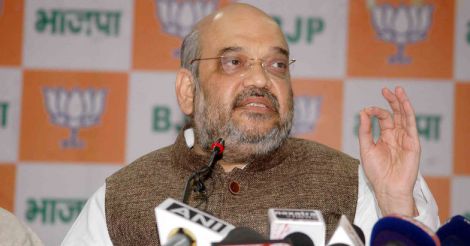New Delhi: The BJP has shown the green flag to the Narendra Modi-Amit Shah combine again. Though he does not have the blessings of senior leaders L.K. Advani and Murli Manohar Joshi, the strong backing of prime minister Modi and the RSS’s trust in him have come to the aid of Shah. The RSS’s thinking that the government and the party must work in unison also came in favour of Shah. Once again a line of BJP office bearers, led by Shah, will act as the B team of the government.
Ayodhya will be decisive
Once the two-year grace period that the VHP granted to Modi government on building a Sree Ram temple in Ayodhya ends in May, Shah will have to break his silence on the subject. Union ministers Rajnath Singh, Uma Bharati and Kalraj Misra are dissatisfied for totally ignoring the Ayodhya dispute in the name of Modi’s development agenda. There is an argument that the Namami Gange project will not be a substitute for Ayodhya in the Hindutva agenda.
As the party’s leaders in the state turn vocal on the issue of constructing the Ram temple, eyeing the UP assembly election, Ayodhya will return as a subject of discussion in BJP conferences. VHP leader Praveen Togadia has made it clear that it cannot wait for the Supreme Court verdict in Ayodhya case.
The Sangh Parivar leadership has already issued a warning that it would not allow a repeat of the Vajpayee government’s decision to break its promise on Ayodhya issue. The VHP will not allow the delay in corrective measures until the final year of the government. In this conflict of interests, Shah’s destiny is to stand between the prime minister and Togadia, an opponent of Modi.
Challenge in UP
When the BJP won four of the six assembly elections under the leadership of Shah, it was like winning a cricket series. To counter the pathetic defeats in Delhi and Bihar, Shah can point to the spectacular victories in Maharashtra, Jharkhand, Haryana and Jammu and Kashmir. His first challenge is to form a government in Kashmir by appeasing PDP leader Mehbooba Mufti, who is reluctant to continue the alliance with the BJP.
Though no major gains can be expected from the assembly elections to be held this year, the party can console itself that there is nothing to lose either. He will test his party’s strength next in Kerala, Tamil Nadu, West Bengal, Puducherry and Assam. The BJP is pinning its hopes of victory on the anti-incumbency sentiment in Assam, where the Congress has been in power for 15 years.
His strategy in Assam is to make Congress leaders defect in large numbers to the BJP. The leadership calculates that the campaign run by Sangh Parivar in Bengal over Malda riots will be converted into votes for the BJP. In Kerala, Shah calculates that his party can reap gains by forging a third front with the BJDS, the party led by Tushar Vellappally. The BJP leadership’s assessment is that there is no point in contesting alone in Tamil Nadu.
But the real challenge to Shah’s election strategies will arise in the assembly election in UP next year. It will also determine his future in the BJP. Also, the mounting anti-incumbency sentiment against the Akali Dal-BJP government in Punjab, where elections are scheduled to be held next year, is not a good sign.
Organisational might
What made Shah a ‘crorepati’ in the party is the success of his missed-call campaign, which took the membership of the BJP from less than 3 crore to more than 11 crore. He attained the goal of beating the Communist Party of China in party membership. Also, training given to active members of the BJP soared during his tenure. The party, which used to train fewer than 4,000 members a year, has by now trained more than 5.25 lakh workers. This has bolstered the party’s ideological base. The target is to train 11 lakh members.
Like the way he coordinates between the party and the government, Shah is also trying hard to take the BJP forward without fighting with Sangh Parivar organisations.























































































































































































































Disclaimer
The comments posted here/below/in the given space are not on behalf of Manorama. The person posting the comment will be in sole ownership of its responsibility. According to the central government's IT rules, obscene or offensive statement made against a person, religion, community or nation is a punishable offense, and legal action would be taken against people who indulge in such activities.